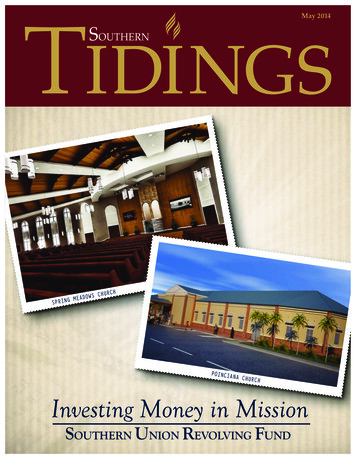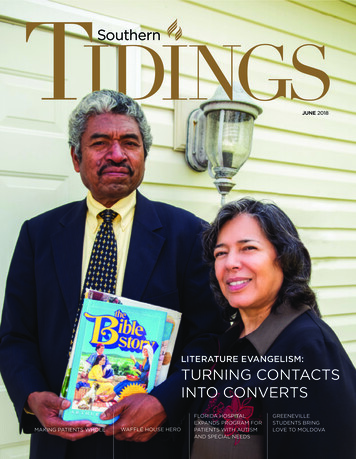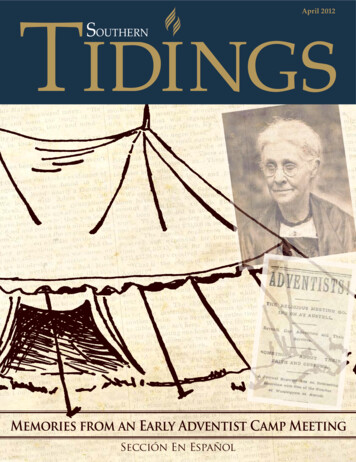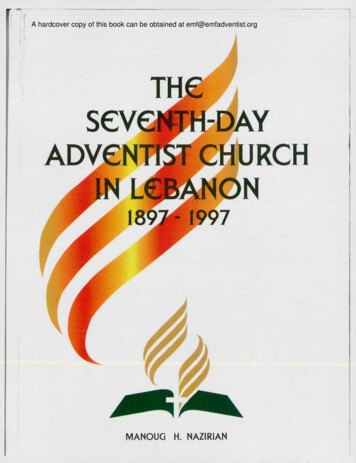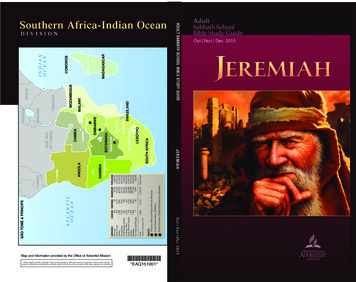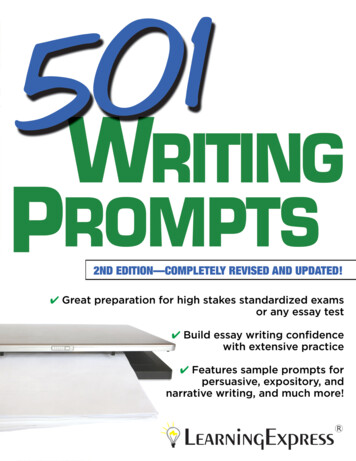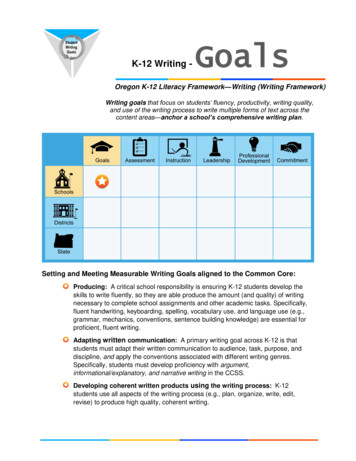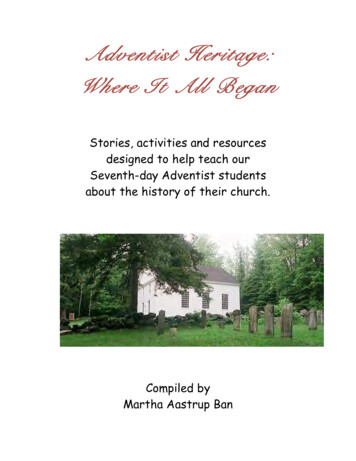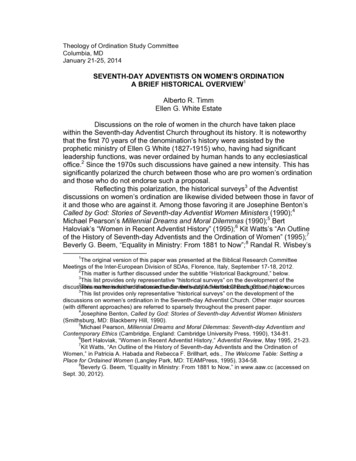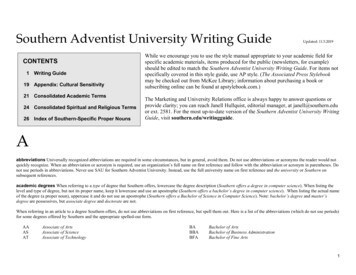
Transcription
Southern Adventist University Writing GuideCONTENTS1 Writing Guide19 Appendix: Cultural Sensitivity21 Consolidated Academic Terms24 Consolidated Spiritual and Religious Terms26 Index of Southern-Specific Proper NounsUpdated: 11.5.2019While we encourage you to use the style manual appropriate to your academic field forspecific academic materials, items produced for the public (newsletters, for example)should be edited to match the Southern Adventist University Writing Guide. For items notspecifically covered in this style guide, use AP style. (The Associated Press Stylebookmay be checked out from McKee Library; information about purchasing a book orsubscribing online can be found at apstylebook.com.)The Marketing and University Relations office is always happy to answer questions orprovide clarity; you can reach Janell Hullquist, editorial manager, at janell@southern.eduor ext. 2581. For the most up-to-date version of the Southern Adventist University WritingGuide, visit southern.edu/writingguide.Aabbreviations Universally recognized abbreviations are required in some circumstances, but in general, avoid them. Do not use abbreviations or acronyms the reader would notquickly recognize. When an abbreviation or acronym is required, use an organization’s full name on first reference and follow with the abbreviation or acronym in parentheses. Donot use periods in abbreviations. Never use SAU for Southern Adventist University. Instead, use the full university name on first reference and the university or Southern onsubsequent references.academic degrees When referring to a type of degree that Southern offers, lowercase the degree description (Southern offers a degree in computer science). When listing thelevel and type of degree, but not its proper name, keep it lowercase and use an apostrophe (Southern offers a bachelor’s degree in computer science). When listing the actual nameof the degree (a proper noun), uppercase it and do not use an apostrophe (Southern offers a Bachelor of Science in Computer Science). Note: bachelor’s degree and master’sdegree are possessives, but associate degree and doctorate are not.When referring in an article to a degree Southern offers, do not use abbreviations on first reference, but spell them out. Here is a list of the abbreviations (which do not use periods)for some degrees offered by Southern and the appropriate spelled-out form.AAASATAssociate of ArtsAssociate of ScienceAssociate of TechnologyBABBABFABachelor of ArtsBachelor of Business AdministrationBachelor of Fine Arts1
BMusBSBSNBSWMAMBAMFMBachelor of MusicBachelor of ScienceBachelor of Science in NursingBachelor of Social WorkMaster of ArtsMaster of Business AdministrationMaster of Financial ManagementMSWMSMSAMSEdMSNMaster of Social WorkMaster of ScienceMaster of Science in AdministrationMaster of Science in EducationMaster of Science in NursingWhen listing credentials after a person’s name in a sentence, include only those credentials that are terminal degrees; MSW and MFA are the only two master’s degrees Southernconsiders terminal; all others are doctoral degrees. However, in a directory setting it is acceptable to list the credentials of the individuals’ highest earned degree. Do not use thecourtesy title “Dr.” in front of a person’s name, not even for medical professionals. Here are some common terminal degrees held by Southern professors:EdDDBADLitt et PhilDMADMinDNPDSNDoctor of EducationDoctor of Business AdministrationDoctor of Literature and PhilosophyDoctor of Musical ArtsDoctor of MinistryDoctor of Nursing PracticeDoctor of Nursing ScienceJDMDMFAMSWPhDThDDoctor of JurisprudenceDoctor of MedicineMaster of Fine ArtsMaster of Social WorkDoctor of PhilosophyDoctor of Theologyacademic titles Capitalize formal titles when they precede a name. Lowercase elsewhere (including when they stand alone without a person’s name).Accent This is an improper shortening of Southern Accent. Acceptable only on subsequent references.ACT Because of wide recognition, it is an acronym acceptable on first reference for American College Test, a standard college entrance examination.adjunct Regardless of employee’s education or experience, the proper use is adjunct instructor, not adjunct professor.Adventist First reference should be Seventh-day Adventist unless used as part of a name (such as in the name of a church). Do not use SDA.adviser Not advisor.ages Always use numerals. Ages expressed as adjectives before a noun or as substitutes for a noun use hyphens: The 7-year-old girl or the 7-year-old, but she is 7 years old.alum, alumni Alum is the appropriate gender-neutral way to refer to one of our graduates. Use alumni when referring to more than one alum. Include graduation year after namewhenever possible: Luke Evans, ’13, wrote an article for Columns. For an alum who also has a graduate degree from Southern, use parentheses: Joe Smith, ’10 and ’12 (MBA),attended Homecoming Weekend. Terminal degrees earned after graduating from Southern should be listed after the year (see academic degrees): Beth Thomas, ’04, PhD, gave arousing presentation. For those who attended but did not graduate, include (attended) following the name: Frank Jones (attended) enjoyed the concert. See years.2
a.m., p.m. Lowercase, with periods.ampersand Avoid unless part of an official corporate name (such as AT&T) or in bite-sized text, such as an infographic or art element. The names of Southern’s schools anddepartments never include ampersands.annual An event cannot be described as annual until it has been held in at least two successive years. Do not use the term first annual. Instead, note that sponsors plan to hold anevent annually. Spell out the number for second annual through ninth annual. Use numbers for 10th annual and beyond.Assist Program Run out of the Enrollment Management office, it provides scholarships to academy students who are paired with elderly mentors. Only the first letter of Assist iscapitalized. The equivalent program for elementary school students is Partnering for Eternity (PFE).associate degree See academic degrees.association Do not abbreviate. Capitalize when part of a proper name: American Medical Association.BBaccalaureate See graduation services.bachelor’s degree See academic degrees.biannual, biennial Biannual means twice a year and is a synonym for the word semiannual. Biennial means every two years.Bible Capitalize when referring to the Scriptures in the Old Testament or the New Testament. Capitalize related terms such as the Gospels, Gospel of St. Mark, the Scriptures, theHoly Scriptures, the Word, the Word of God.Lowercase biblical in all uses.Lowercase bible as a non-religious term: My dictionary is my bible.Do not abbreviate individual books of the Bible.biblical citation Cite chapter and verse(s) using this form: Psalm 27:2, Matthew 3:16, Luke 21:1-13, 1 Peter 2:1. Credit the version (unless quoting from KJV) using this form:Matthew 16:1, NIV. Permission to reprint will also need to be cited in the document or publication. For more information look at copyright information included atbiblegateway.com or consult with Marketing and University Relations.bimonthly Bimonthly means every other month. Semimonthly means twice a month.Biology Trails Not an accepted name for Southern’s trail systems. White Oak Mountain Trails is the name of the trail system on the west side of the valley and Fenton Forest onBauxite Ridge denotes the system on the east side.3
biweekly Biweekly means every other week. Semiweekly means twice a week.Board of Trustees Capitalize when referring to Southern’s Board of Trustees (board when used alone on subsequent references). Lowercase when referring to otherorganizations’ boards.books See composition titles.bulleted lists Use a colon to introduce a bulleted list unless the sentence introducing the list is complete and each item in the list is a complete sentence. Do not punctuate partialsentences in lists. Make all items in the list congruent (for example, if the first bullet begins with a verb, make all of the bullets begin with a verb).Ccafeteria This is not an official name. See Dining Hall.camp meeting Two words. Keep lowercase unless part of an official name. This year’s camp meeting was great. I attended Carolina Conference Camp Meeting 2019.Campus Ministries The umbrella organization for several student-led ministries overseen by the Chaplain’s Office, which is located in the student center.canceled There is only one “l” in canceled.capitalization In general, avoid unnecessary capitalization, which should be reserved for proper nouns. Capitalize official names of departments at Southern, but lowercase jobtitles unless they precede a person’s name. When referring to departments at institutions and companies outside of Southern, capitalize only after confirming that it is an officialformal name. For capitalization of Christian terms, see Appendix: Spiritual and Religious Terms.chair Use this gender-neutral term instead of chairman. This also refers to the leader of an academic department; the leader of an academic school is a dean.Chattanooga When communicating with an audience familiar with the area, there is no need to add Tennessee after the city name.Chattanooga Times Free Press Italicize. Use Times Free Press on subsequent references.child/kid Acceptable only for elementary and secondary age students. Should not be used for college and university students. See student.Christlike One word.church Capitalize as part of the formal name of a building, congregation, or a denomination; lowercase in other uses: Ooltewah Seventh-day Adventist Church, a Seventh-dayAdventist church.4
cities Most cities need to be followed by the state name for clarification. Exceptions are listed in the AP Stylebook. For information on how to refer to local cities, see Cleveland,Tennessee; Chattanooga; or Collegedale. For formatting information, see states.class Primarily refers to academic standing or a group of students who meet regularly with a professor. He is in the junior class. The class surprised their professor with cake.Lowercase with a year in “class of” constructions: class of 1998. When referring to something that is taught, use course instead. I am teaching three courses this term.class standing Use an undergraduate student’s class standing (freshman, sophomore, junior, senior) and major when introducing the student in an article: Samantha Davis,junior social work major, coordinated the event. Do not capitalize class standing or major. See majors. For graduate students, incorporate the degree they are pursuing into thesentence: On Campus Research Day, Ben Edwards, who is earning a master’s degree in computer science, surprised everyone by presenting about cats.Cleveland, Tennessee Followed by state name to distinguish from the city of Cleveland, Ohio.CLEP College Level Examination Program. Use full name on first reference. Do not use as a verb. A student who attempts to receive credit for a class and demonstrates sufficientknowledge by taking a test has successfully challenged a class (not clepped a class).coach Do not use as a courtesy title, as in Coach Johnson, except as part of a direct quotation. Instead use the person’s full name followed by the appropriate title.College Press Printing press located on campus that has been in operation since 1917. Once associated with Southern, this business is now independently owned.Collegedale When communicating with an audience familiar with the area, there is no need to add Tennessee after the city name.Collegedale Academy Can abbreviate as CA (no periods) on subsequent references. This refers to the entire school system, from early childhood education to 12th grade(formerly known as A.W. Spalding Elementary, Collegedale Adventist Middle School, and Collegedale Academy).Collegedale Church of Seventh-day Adventists Not Collegedale Seventh-day Adventist Church or the University Church. Collegedale Church is acceptable on subsequentreferences.Columns Italicize (within the magazine itself, use all caps and don’t italicize). The official magazine of Southern Adventist University.comma—rules for useConjunctions (and, but, or, yet, for, nor, so) need to be preceded by a comma when they join two independent clauses. In other words, if you could split the sentence into twostand-alone sentences by simply removing the conjunction, include a comma.In a series, commas should be used before the conjunction. The flag is red, white, and blue. If the series is complex, use semicolons to separate the elements of the series.Family members include his wife, Jane; two daughters, Jill and Julie; and a son, John.When deciding if a comma needs to go between two adjectives, flip the adjectives. If the sentence still makes sense, a comma is likely needed. He is a smart, athleticstudent.Renaming vs. clarifying: When you’re renaming an item, you use a comma. His wife, Jane, is happy. (We assume he has only one wife.) When you’re clarifying an item, nocomma is needed. His classmate Jerry scored better on the quiz. (We assume he has more than one classmate.)5
Commencement See graduation services.committee Do not abbreviate. Capitalize when part of a formal name: the House Appropriations Committee. For information on Southern committees, refer to the EmployeeHandbook.composition titles Italicize titles of complete works, such as books, magazines, poems, etc. Put in quotation marks works that are part of a larger piece, such as chapters andmagazine articles. Example: I enjoyed reading the chapter titled “The Joy of Commas” in Grammar Geek. Capitalize the principal words, including prepositions and conjunctionsof four or more letters. If a preposition or conjunction with fewer than four letters is the first or last word of the title, capitalize it as well: On Writing Well: the Classic Guide toWriting Nonfiction.Consecration See graduation services.convocation Lowercase. Meets Thursdays at 11 a.m. during the school year.coordinator for Avoid coordinator of. Uppercase when preceding a name; lowercase after references. Samantha Brown, counseling services coordinator for the Student SuccessCenter, spoke during orientation.courses Capitalize the names of official course titles. American History and Institutions is capitalized but history class isn’t. Look in the current undergraduate and graduatecatalogs for official names of courses.creation Do not capitalize in any context. The Origins Exhibit explores the creation story.credentials See academic degrees.credit hours See numerals.Ddashes When using a dash to represent a long pause or add emphasis to a phrase within a sentence, use em-dashes without spaces, not regular dashes or en-dashes (which areshorter): They lived a fairy tale life—without the happily ever after.dates Always use numerals, without st, nd, rd or th: January 3, 1776. When including the day of the week, set off with commas: Tuesday, January 21, is my birthday. Our firstday of classes is Monday, August 26. See months, annual.days of the week Capitalize and do not abbreviate.6
dean Do not use as a courtesy title, as in Dean Smith. Instead, use the person’s full name followed by the appropriate title. When context makes it clear what the person is dean of,dean is enough. When clarification is needed, use dean (or associate dean) of men, dean of women, dean of Thatcher South, or dean of the School of . Examples: LisaHall, dean of students, loves her job. The men of Talge Hall prepared a special birthday surprise for John Smith, dean. See titles. Dean also refers to the leader of an academicschool.dean’s list Lowercase in all uses: He is on the dean’s list. She is a dean’s list student.degree Refers to the official academic degree earned, such as Bachelor of Science or Master of Business Administration (see academic degrees).departments The names of academic schools and departments as well as administrative departments should always be capitalized. In a series, multiple schools should be listedas the schools of Nursing, Computing, and Religion. See capitalization.Dining Hall This is the official name of the main eating area on campus. Do not use cafeteria.director for Avoid director of. Uppercase when preceding a name; lowercase after references. Laurie Gauthier, director for Graduate Studies, attended a job fair to speak withpotential students.divine pronouns Capitalize pronouns referring to God.doctorate Never doctorate degree, although doctoral degree is acceptable. He earned a doctorate in 2007; his doctoral degree was in nursing.dormitory Avoid dormitory or the abbreviated word dorm. Use residence hall instead.Dr. Do not use as a courtesy title except as part of a direct quotation. Instead, list the individual’s terminal degree after the name (see academic degrees).Ee.g. Use the words “for example” instead of this abbreviation. Do not confuse for i.e., which essentially means “in other words.” See i.e. for its usage.eJoker Southern’s online pictorial directory, (there are no paper versions, as there were in the past). It can be found at southern.edu/ejoker.email Use a lowercase e (unless the word is at the beginning of a sentence or in a capitalized contact list), without a hyphen.emeritus This word is often added to formal titles to denote individuals who have retired and retain their rank or title. When used, place emeritus after the formal title:Professor Emeritus John Smith, or John Smith, professor emeritus of history.employees The broad term encompassing both faculty (teaching professionals) and staff.7
entitled Use it to mean a right to do or have something. Do not use it to mean “titled.”Right: She was entitled to the promotion.Right: The book was titled “Gone With the Wind.”evolution Do not capitalize in any context. The professor addressed the theory of evolution.Ffaculty Employed teaching professionals. Employed non-teaching professionals are staff. See adjunct.foreign words Italicize non-English words if they are not regularly used in English.freshman Plural is freshmen. See class standing.fundraising Always one word, no hyphen.full-time, full time Hyphenate only when used as an adjective: He works full time. She has a full-time job.Ggender When referring to a nonspecific individual whose sex is not known and cannot be reasonably inferred, use he or she or his or her. Sometimes a writer can avoid theawkwardness of this construction by changing the entire sentence to be in the plural rather than the singular. For example, instead of “The student should register for his or herclasses online,” you could say, “Students should register for their classes online.” Avoid gender-specific terms such as policeman, fireman, or chairman. Use police officer,firefighter, or chair instead.Gospel Capitalize when referring to any or all of the first four books of the New Testament. Lowercase in all other references. The Gospels tell us about Christ’s life on Earth.Let’s spread the gospel message throughout the world.GPA Acceptable in all references for grade-point average. Don’t use periods.grade, grader Hyphenate both the noun forms (first-grader, second-grader, 10th-grader) and the adjectival forms (a fourth-grade pupil, a 12th-grade student). See numerals.grade marks Capitalize letter grades. A , Bgraduate See undergraduate/graduate.8
graduation services Capitalize the following services:Friday: ConsecrationSabbath: BaccalaureateSunday: Commencementgraduation year Use an apostrophe before the last two numerals in the individual’s graduation year. For example: ’94. (Note that Microsoft Word will automatically change theapostrophe to the correct direction when you press the space bar following the number.)HHamilton Place Mall is not part of the proper name.healthcare One word in all instances, except in the case of some proper nouns and in the term home health care.Heaven Capitalize when referring to the biblical location.Lowercase heavenly in all cases.Lowercase heaven as a non-religious term: I was so happy; I was in heaven!high school Two words. Do not hyphenate as an adjective.Holy Spirit Capitalize both the full name and the stand-alone Spirit, when used as a divine reference: God’s Spirit descended on the apostles on the day of Pentecost.home page The first page of a website.home-school Hyphenate.homework One word.honor roll Southern uses the phrase dean’s list instead of honor roll. When using either term, lowercase.Ii.e. Use the words “in other words” or the i.e. abbreviation. Do not confuse for e.g., which essentially means “for example.” See e.g. for its usage.internet Industry standards now recommend lowercasing the “i.” Do not use the term the Net.9
italics Use italics sparingly in copy. Primary use is for composition titles. May also be occasionally used to add emphasis.JJumpStart A program specifically designed to equip first-year students on conditional standing with the tools needed to be successful at Southern.junior, senior Include and abbreviate Jr. and Sr. only with proper full names; do not precede by a comma: Joseph P. Kennedy Jr. Last name only on subsequent references. Seeclass standing.Kkid/child Acceptable only for elementary and secondary age students. Should not be used for college and university students. See student.Kingdom Capitalize when referring to the Kingdom of God.Llectern, podium, pulpit, rostrum A speaker stands behind a lectern, on a podium or rostrum, or in the pulpit.lectures Capitalize and use quotation marks for their formal titles.Lights Volunteers This is the official name of Southern’s volunteer organization and the individuals who participate. Do not use the term Southern Lights.login, logon, logoff Used as a single word when positioned as a noun. Customer support advised me to update my login information. Used as two words when in verb form.I log in to my computer.LifeGroup One word; refers to student-led small groups.10
Mmagazine names Capitalize and italicize the name. Lowercase and don’t italicize “magazine” unless it is part of the publication’s formal title: Harper’s Magazine, Timemagazine, Newsweek magazine. Never underline magazine titles.major Refers to the area of specialization within the degree. She is a public relations major. Lowercase majors, unless that major is also a proper noun (such as English). For acomplete list of majors offered at Southern, refer to the Undergraduate Catalog.Master of Arts, Master of Science A master’s degree or a master’s is acceptable in any reference. See academic degrees.MBA See academic degrees.media In the sense of mass communication, such as magazines, newspapers, the news services, radio and television, the word is plural: The news media are resisting attempts tolimit their freedom. Not: The news media is resisting attempts to limit its freedom.Memorial Auditorium Standard use for Soldiers and Sailors Memorial Auditorium in downtown Chattanooga.Memories This is an improper shortening of Southern Memories. See Southern Memories.minor Refers to a secondary program in which an individual is studying without taking enough credits to earn a degree in that area.months Do not abbreviate. Capitalize the names of months in all uses. When a phrase lists only a month and a year, do not separate the year with commas. The professor retiredin May 2019. When a phrase refers to a month, day, and year, set off the year with commas. It was on January 17, 2015, that the construction began. See dates.more than Use this term with numerals rather than using the word “over,” which is a preposition that describes location: The football made it over the goal post. More than 9,000people attended the football game.mph Acceptable in all references for miles per hour.musical titles Proper names of musical pieces, such as Messiah, Don Giovanni, or The Creation, are italicized. Musical tempo, such as allegro non troppo, andante, or adagio, isoften italicized. Musical movements, such as Symphony No. 5 in C Minor; Piano Concerto No. 23 in A Major; or String Quartet, Op. 33, No. 6, are not italicized.11
Nnames Use full names of all individuals on first reference; on subsequent references, use last names. Exception: when writing about individuals age 16 or younger, use first nameon second reference. When article includes multiple people with same last name (married couple, for example) use full name for all non-pronoun references. Capitalize namesreferring to God such as Emmanuel, Light of the World, Creator.nationalities Do not hyphenate compound nationalities such as African American, even when used as an adjective. But always hyphenate compounds with name fragments: AfroAmerican, Indo-European. See Appendix: Cultural Sensitivity.New Earth Capitalize.non In general, no hyphen, except before proper nouns (non-American, non-English) and to avoid awkward combinations such as repeating letters (non-nuclear, re-emphasize).numerals Spell out numbers one through nine; use numerals from 10 on. There are many exceptions to this rule: the most common for Southern’s purposes are ages, course credithours, and percentages. All of those use numerals. See the AP Stylebook for additional exceptions.Oon-campus/on campus Hyphenate when using this term as an adjective. The on-campus housing is full. Write as two words when using this term as a prepositional phrase. Thehousing is full on campus.online One word in all cases for the computer connection term.Online Campus (not Southern Online) refers to Southern’s online classes program.over Use for descriptive situations such as The book is over there. Avoid using over to describe things in excess; instead use more than.Ppage numbers When used with a number but not in a sentence, capitalize “page.” When a letter is appended to the number, capitalize the letter but do not use a hyphen: Page 1,Page 10, Page 20A.Partnering for Eternity Program Run out of the Enrollment Management office, it provides scholarships to elementary school students who are paired with elderly mentors.The abbreviation PFE is acceptable on subsequent references. The equivalent program for academy students is Assist.12
part-time, part time Hyphenate when used as an adjective: She has a part-time job. She works part time.percent Using the percent sign (%) except in casual use such as He has zero percent chance of passing the test. Use numerals for percentages: 15%.perspective/prospective Perspective has to do with point of view and is usually a noun. Prospective has to do with the future and is usually an adjective. Southern recruitsprospective students who look at life from a Christian perspective.PhD See academic degrees.phone numbers Use periods (not hyphens or parentheses) when listing phone numbers: The student called 1.800.SOUTHERN to learn more about the university.podium See lectern, podium, pulpit, rostrum.possessives For both common nouns and proper nouns ending in “s” add apostrophe but no additional “s.” I heard the witness’ story in court. I read Jesus’ words in the Bible.president Capitalize president only as a formal title before one or more names: President David Smith is pleased to welcome new students. Lowercase in all other uses: TheStudent Association president said today he is running for re-election. David Smith has been Southern’s president for several years.President’s Circle Donors who give more than 1,000 each year are part of this group.PreviewSouthern One word; refers to designated campus visit days.professor Never abbreviate. Capitalize before a name, as in Professor John Smith. Do not continue in subsequent references unless part of a quotation. Some faculty members arereferred to as associate professor, assistant professor, or instructor. Check job titles with the Campus Directory or on Access. See adjunct.program Do not capitalize unless part of a recognized proper noun (see Index of Southern-Specific Proper Nouns).pronouns Do not use “their” as a singular pronoun. Use “his or her” (not his/her) instead, or rewrite the sentence so the subject is plural. Capitalize pronouns for God.publications On-campus publications include Columns, Southern Accent, and Southern Memories. See composition titles.pulpit See lectern, podium, pulpit, rostrum.13
Qquotation marks Smart quotes (which are curly) should be used rather than straight quotes, whenever possible. Use quotation marks when quoting a person or when identifyinga magazine article or book chapter. They may also be used when introducing a new word. They should not be used to add emphasis to a word. He said, “I can’t believe it!” I readthe article “Understanding Grammar.” The word “stet” means to let it stand. But not: We had a “wonderful” time. Use single quotation marks when quoting within a quote. Seecomposition titles.Rrace See Appendix: Cultural Sensitivity.radio stations Refer to by the station’s call letters, and if necessary, use frequency. Refer to the university station as Classical 90.5 WSMC.residence hall On-campus housing for women or men. Don’t refer to as dorm or dormitory.résumé Use two accents.rostrum See lectern, podium, pulpit, rostrum.SSabbath Capitalize in religious references; lowercase to mean a period of rest. When writing for a non-Adventist or mixed audience, use Saturday for the seventh day of theweek.Sabbath School Capitalize both words.SACSCOC Southern Association of Colleges and Schools Commission on Colleges, the reaffirmation accreditation body that visits every 10 years.SALT A joint evangelism training venture between Southern and It Is Written. Stands for Soul-winning And Leadership Training.Satan Capitalize, but lowercase devil and satanic.SAU Do not use the acronym SAU; see Southern Adventist University.14
Savior Capitalize when referring to Jesus Christ. Use this spelling, rather than the alternate form, saviour.school Capitalize when part of a proper name: Public School 3, Madison Elementary School. Capitalize and use the full names for all acad
DSN Doctor of Nursing Science JD Doctor of Jurisprudence MD Doctor of Medicine MFA Master of Fine Arts MSW Master of Social Work PhD Doctor of Philosophy ThD Doctor of Theology academic titles Capitalize formal titles when they precede a name. Lowercase elsewhere (including when they stand alone without a person's name).
